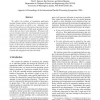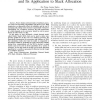466 search results - page 8 / 94 » Using Queue Time Predictions for Processor Allocation |
197
Voted
ASMTA
2011
Springer
14 years 5 months ago
2011
Springer
Queueing delays experienced by packets buffered at a node are among the most difficult to predict when considering the performance of a flow in a network. The arrivals of packets a...
109
click to vote
IPPS
1996
IEEE
15 years 6 months ago
1996
IEEE
We address the problem of maximizing application speedup through runtime, self-selection of an appropriate number of processors on which to run. Automatic, runtime selection of pr...
129
click to vote
IPPS
2010
IEEE
14 years 11 months ago
2010
IEEE
Abstract--Power density and heat density of multicore processor system are increasing exponentially with Moore's Law. High temperature on chip greatly affects its reliability,...
131
click to vote
NPL
1998
15 years 1 months ago
1998
Abstract. One of the main problems associated with arti cial neural networks online learning methods is the estimation of model order. In this paper, we report about a new approach...
118
Voted
GRID
2008
Springer
15 years 3 months ago
2008
Springer
Large-scale computing environments, such as TeraGrid, Distributed ASCI Supercomputer (DAS), and Grid’5000, have been using resource co-allocation to execute applications on mult...



